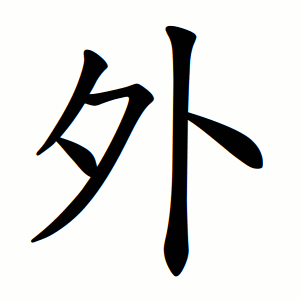外
- outside;
- surface;
- exterior;
Etymology
In oracle bone inscriptions, the character appeared in forms resembling 卜 (to divine), which could also carry the meaning of “outside.”
Some forms combined 卜 with 內 (inside), emphasizing contrast between “inside” and “outside.”
In bronze inscriptions, 月 (moon / body part radical) was added on the left, and in some variants 夕 (evening) also appeared. By the seal script stage, the form with 夕 became standardized.
Traditional interpretation (as in Shuowen Jiezi): a compound of 夕 (evening, night) + 卜 (divination), with the idea that “divination performed at night is unusual, outside the norm.”
Often analyzed as a phono-semantic compound, with 月 providing the phonetic element and 卜 contributing meaning.
Semantic range:
- outside, exterior (바깥, 겉);
- beyond, external (외부, 대외);
- by extension, foreign, other, unrelated.
Usage in Korean
외부 (外部) — the outside, the exterior
외국 (外國) — foreign country
외교 (外交) — diplomacy
외모 (外貌) — outward appearance
외출 (外出) — going out
시외 (市外) — outside the city
Words that derived from 外
- 국내외(國內外)–home and abroad; domestic and foreign
- 성형외과(成形外科)–plastic surgery; department of plastic surgery
- 시외(市外)–suburbs
- 시외버스(市外bus)–intercity bus
- 외(外)–An expression used to indicate that something is beyond a certain range or limit
- 외가(外家)–maternal family
- 외계(外界)–outer world; external world; outer space
- 외과(外科)–surgery; department of surgery
- 외교(外交)–diplomacy
- 외국(外國)–foreign country
- 외국어(外國語)–foreign language
- 외국인(外國人)–foreigner
- 외모(外貌)–appearance
- 외무(外務)–foreign affairs
- 외삼촌(外三寸)–one's maternal uncle
- 외세(外勢)–foreign power; foreign influence; external situation; external circumstances
- 외숙(外叔)–maternal uncle
- 외숙모(外叔母)–wife of one's maternal uncle
- 외침(外侵)–foreign invasion; invasion from outside
- 외투(外套)–outer garment
- 외할머니(外할머니)–maternal grandmother
- 외할아버지(外할아버지)–maternal grandfather
- 외형(外形)–appearance; shape; form; situation; circumstances
- 의외(意外)–being unexpected
- 이외(以外)–the others; being other than
- 해외(海外)–foreign country; overseas
- 弓戈卜 (NIY)
- ⿰ 夕 卜 (G H T V H K)
